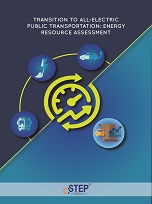Transition to all electric public transportation: energy resource assessment
There has been a surge of interest regarding the adoption of electric vehicles (EV). The idea of large-scale penetration of EV presents a new set of sectoral planning challenges. This move will require coordinated planning between three sectors: transportation, urban planning and power. In this report, examine the ‘Transition to All-Electric Public Transportation', focusing on the charging energy requirement in 2030. This assessment pertains to select four-wheeler taxi categories and public buses. Also explore the role of renewable energy and estimate the contribution of fossil-free generation sources, in terms of energy and equivalent capacity addition, to support this need. Inclusion of this additional capacity will help India realise its Nationally Determined Contribution (NDC) targets. In terms of charging energy needs for routine operation, EV would require about three times less energy than diesel-based transport. Considering the growth rate indicated by the Ministry of Road Transport and Highways, and assuming 100% EV adoption by 2030 for the vehicle segments considered in this study, the additional annual energy requirement is estimated to be around 76 Billion Units (BU). The fossil-free generation capacity needed in addition to the planned generation (for
2030) works out to be around 23 GW.


